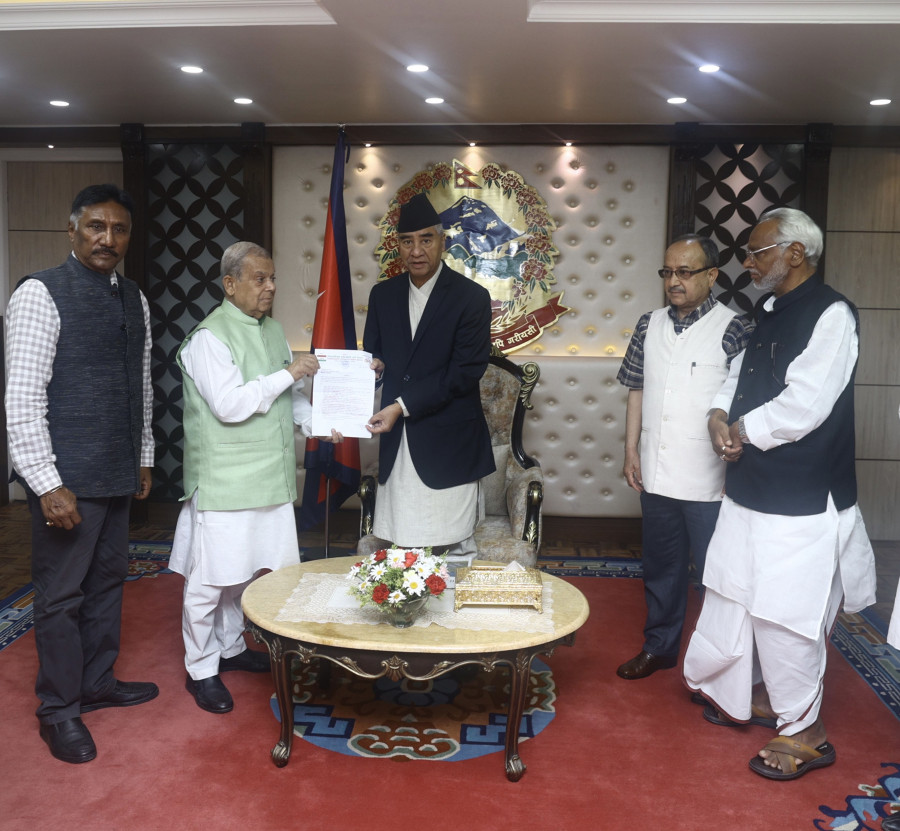Politics
Loktantrik Samajbadi presents its wish list to Deuba in preparation for joining government
The prime minister is seeking to broaden the alliance in view of upcoming elections and also to save the government from possible unplugging of support.
Binod Ghimire
The Loktantrik Samajbadi Party fared badly in the recent elections. The party lost close to 40 percent of the local units it had won in the 2017 elections. It was the largest force in Madhes Province after the Nepali Congress and Janata Samajbadi Party, winning 25 out of 136 local units.
The Mahantha Thakur-led party has now slipped to the fourth position, winning just 14 local units in the province which it claimed to be its bastion. Its poor show in the polls has prompted it to explore partnerships with other parties.
Three days after meeting Prime Minister and Nepali Congress President Sher Bahadur Deuba, Thakur, along with some of his party leaders, on Tuesday submitted an 11-point charter of demands to Deuba.
The demands included resolving the citizenship issue and releasing those arrested during the Madhes and Tharu movements in the past. Among other demands are the release of Resham Chaudhary, a suspended member of the House of Representatives, amendments to the constitution and laws to delineate the number of local units based on population, and unveiling an investigation report on the atrocities committed during the protests in the lead-up to the constitution promulgation in 2015.
The party has also demanded government action to curb inflation and black marketeering and keep the marginalised communities in priority while distributing land to the landless.
Party leaders say engagement with the ruling coalition will depend on the government’s response to their demands. They say Deuba has committed a process to address their concerns immediately after budget endorsement.
“There will be a positive environment for the engagement if our demands are addressed genuinely,” Uma Shankar Argariya, the party’s whip, told the Post. “However, there has been no development on joining the government yet.”
The party had contested the local elections almost alone, except for arrangements in a few places with the CPN-UML. On the other hand, five parties of the ruling coalition—Nepali Congress, CPN (Maoist Centre), CPN (Unified Socialist), Janata Samajbadi Party and Rastriya Janamorcha—fought the local polls broadly in an alliance.
In the recently held meeting of the party secretariat, members discussed the necessity of contesting the federal and provincial elections by forming an electoral alliance.
“We will form an electoral alliance although it hasn’t been decided yet with which parties,” Keshav Jha, a central executive member of the party, told the Post. “Whether we partner with the ruling alliance will depend on how seriously the government takes our concerns.”
He said Deuba has assured to start implementing their demands immediately after the national budget gets through Parliament.
The bills related to the national budget will be put to vote by mid-June, according to Gopal Nath Yogi, secretary at the House of Representatives.
Those who follow Madhes politics closely, argue that the demands put forth by the party are genuine. However, rather than actually pressuring the parties in power to implement the demands, the Loktantrik Samajbadi is using them as a tool to further its interests.
Tula Narayan Shah, a political commentator who follows Madhes politics closely, said the meeting between Deuba and Thakur and Tuesday’s 11-point demand clearly show something is cooking.
According to him, the 11-point memo is aimed at creating the backdrop for the party to join the government.
“The problem with identity-based politics in our part of the world is that such parties are always desperate to join the government while also pretending to show they have kept the issues related to the people alive,” said Shah. “The demands from the Loktantrik Samajbadi Party are nothing but a strategy to confuse the Madhesi people.”
As claimed by Shah, the history of the party shows it has raised the issues of Madhesi people whenever it wants to join the government.
Then Thakur-led faction of the Janata Samajbadi Party in June last year had joined the erstwhile KP Sharma Oli government after it issued an ordinance to amend the Citizenship Act. The ordinance, however, was quashed by the Supreme Court. The party supported Deuba in the vote of confidence in the following July.
Shah said there are chances of a deal between the Deuba government and the Loktantrik Samajbadi Party very soon and the party will present the agreement before the public to claim it is committed to addressing their concerns.
Experts say the Loktantrik Samajbadi Party needs support to contest the polls due later this year.
The Congress, on the other hand, doesn’t want the party to form an alliance with CPN-UML which could create a problem for the party.
Chandra Kishore, a commentator who follows Madhes politics closely, said not just the Thakur-led party but the Upendra Yadav-led Janata Samajbadi is also using the concerns of the marginalised communities to get to power.
He says the two parties had a clear mandate from the people in the 2017 general elections to remain in opposition and pressure the major parties to address the issues relating to citizenship and federalism, among others.
“However, both the parties used the concerns of the Madhesi people as a ladder to ascend to power,” he told the Post. “The Loktantrik Samajbadi Party desperately wants to join the government. If any of the concerns are addressed it will be a face saver for it to become part of the Deuba administration.”




 17.12°C Kathmandu
17.12°C Kathmandu















